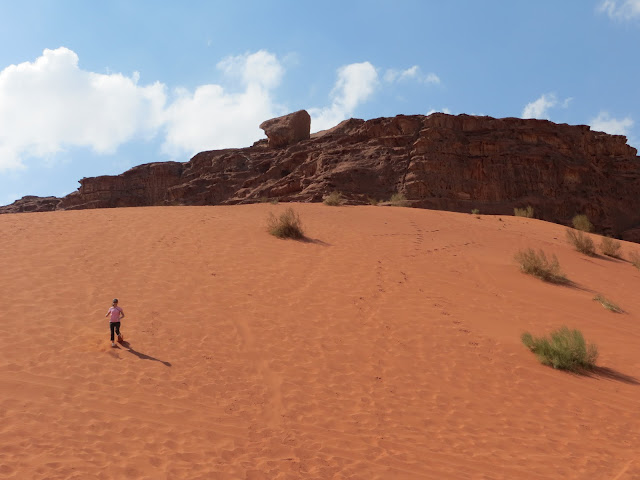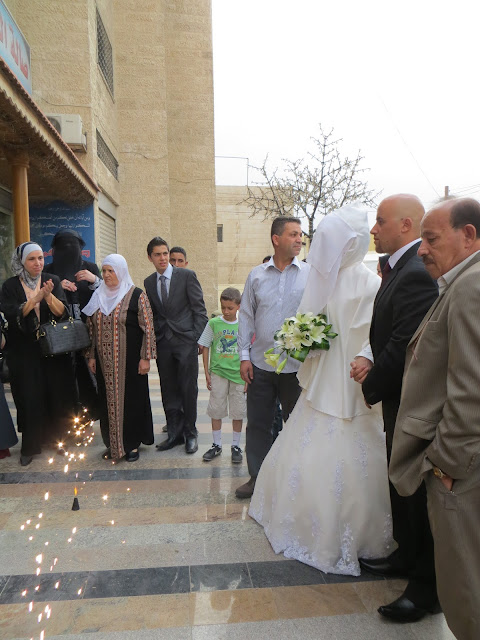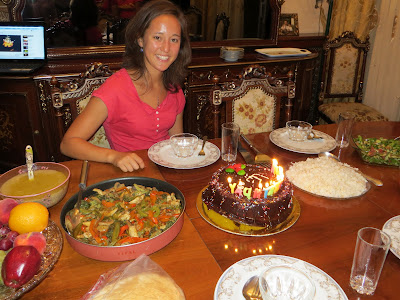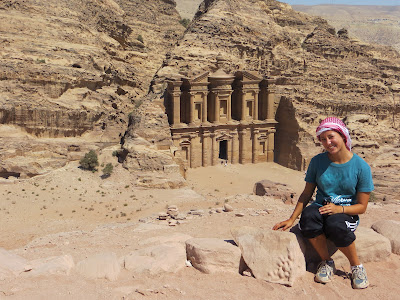I wrote this article a few weeks ago for the Rice Standard, so it is slightly outdated, but I still thought it would be nice to share:
Studying abroad is not just about the
rosy experience of intercultural learning, speaking a foreign language,
and self-reflection. It is also about recognizing what I have left behind,
especially the aspects of life that I take for granted while living in the
United States. In the beginning of my semester in Jordan, I missed my morning
bowl oatmeal and brewed coffee, shorts and t-shirts, and being able to walk to
lectures. After I reconciled these trivial parts of life, I missed the
camaraderie of the Rice club soccer and ultimate Frisbee teams, the quietness
of Fondren stacks, and the smell of rain. Missing these things just makes me
appreciate them more. Yet, one of the most
important aspects of life I have truly come to appreciate is the intangible,
priceless right to the freedom of expression.
 |
| The beautiful desert at Wadi Rum, in the southern part of Jordan close to Saudi Arabia. |
Now that the semester is more than half way over, I am able to understand
more details of Jordanian culture and life, rather than the
generalizations. I can engage in serious
conversations enabled by my increasing fluency in Arabic, dig much deeper than
the superficial layer of tourism, and strengthen personal relationships with mutual understanding. These realizations do
not just reflect life here in Jordan, but they also, strangely enough, affect
my understanding of life in the United States.
In the past couple of weeks, many of my experiences, whether
through visiting the Amman public radio station, engaging in a discussion with
my Jordanian friends outside of class, or
conducting interviews with physicians for a research project, have all seemed to connect one way or another to issues
with freedom of expression. When I mentioned my thoughts about writing this
article to my Jordanian host father during our post-dinner news-watching
session, he chuckled, saying (in Arabic), “Oh, that’ll be easy, Jordan has
fantastic freedom of expression.” His laughs belied his words, and then in a
more serious tone: “There is not much freedom here, but America has the most
freedom of any country.” He turned back to watching Al Jazeera—which he also
noted is not an independent news source—and I went to start writing.
There it is. We, growing up as Americans, hear over and over
again that we are fortunate to have freedom of expression not just written in
our Constitution, but also actively enforced by our government, courts, and
society. According to Human Rights Watch’s “Freedom in the World 2012” report,
Jordan is considered “Not Free” and ranks in category 6 for political rights
and category 5 for civil liberties, where 1 represents the most free and 7 the
least free. These ratings do not even take into account the recent endorsement
in September of amendments
to Jordan’s Press and Publication Law, which imposed additional restrictions on
freedom of expression online.
Aside from the official face of government and rankings, I
have encountered these challenges to free expression on a more personal level.
One of the program managers organized a trip for the students to visit Al-Balad Radio headquarters, which is an independent,
public radio station in Amman. Among other topics, we discussed issues
surrounding freedom of expression in the press during our meeting with the
manager. She said that the environment has improved after the start of Arab
Spring, but several lines of red tape remain. The most prominent taboos are public criticism of the royal family (punishable up to three years in prison),
questioning the military establishment (especially the budget, about which any
information is completely inaccessible), and challenges to the Islamic faith.
Before the Arab Spring, the radio station used to receive
calls daily from Jordan’s secret police, renowned regionally for their strength
and infiltration, to monitor programs as well as online posts, but most of
these calls have stopped. However, the censorship remains. Likewise, the two
largest newspapers in Jordan are government owned, and even many of the
independent ones have close connections to the government. In short, media
freedom of expression is severely curtailed, which not only affects the quality
and credibility of information available, but also suggests a widespread fear
of crossing the acceptable “boundary,” leading to self-censorship. The manager
praised the work of the many bloggers who are now challenging the news agencies
to provide more accurate information, but she is highly concerned about the
amendments to the media law that could pose a major threat to freedom
online.
The fear of crossing the
censorship line is real; I have witnessed it myself in Jordanians’ daily lives.
One example is especially distressing because it involves not politics, but
academia. Earlier this week, I was conversing outside of class with one of my friends
– I will call her Fatima for the sake of privacy – who is currently writing her
doctoral thesis for the Faculty of Shari’a (Islamic Studies) at the University
of Jordan. She is in her fifth year and hopes to finish by the summer of 2013.
Besides the difficulty of her topic, which critiques certain Hadith from the
Prophet Mohammed to address contemporary issues in Islam, Fatima is struggling
internally about the scope of her dissertation. She wants to include topics
that she believes are extremely relevant but controversial. Many Islamic
scholars in Jordan regard such criticisms of Islam as an unacceptable challenge
that they fear may lead to a slippery slope of rejecting the veracity of some
of their major religious texts. If she decides to include what she truly
believes is correct, she may risk the rejection of her dissertation entirely,
not on the basis of the quality of research and writing, but because of the intolerance
of scholars within her own religion. Thus, Fatima would have exerted herself
for the past five years for nothing other than tuition fees, lost time with her
husband and son, and countless other stresses.
 |
| A view of (part of) Amman at dusk. I live in a relatively quiet, residential part of the city that has not been affected by the recent protests. |
Fatima drew a picture with her hands to compare herself, as
a moderate Islamic scholar in Jordanian society, to a small bird struggling to
fly in stormy weather. She is at the mercy of the buffeting winds that push her
around without regard, making her feel lost, alone, and in danger. She and her
husband are strongly considering moving outside of the Arab world in the coming
years so that she will be able to publish her writings. Otherwise, she said,
there is little hope of finding a publisher in Jordan or in the surrounding
Arab countries because of the content of her writings.
Sometimes, pressure to limit my
own speech during personal conversations with Jordanians pushes the limits of
my own self-control. One evening, I was watching the news with my host family and some relatives the day
after the U.S. presidential elections, and my host aunt – I will call her Noura
– asked me about same-sex marriage in the United States, obviously stemming
from something she had heard in the news about recent policies being approved. Her
facial expressions already indicated how she felt about the issue, but I
explained in an even tone that some states now allow same-sex marriage, but
there is no federal policy regarding their marriage rights. For most Muslims
that I have met, same-sex marriage is not an issue of individual human rights,
but is tied to their religious beliefs. Noura stated
that homosexuality is disgusting and unethical, forbidden by the Qur’an and
punishable by God. She cited a passage in
the Qur’an in which God destroyed the cities of Sodom and Gomorrah with a
violent wind that turned them upside-down as a
punishment to the people who were
engaging in acts of sodomy and rape. She also reasoned that God created two
genders for a purpose, and we are thus supposed to marry and have children with the
opposite sex in order to raise a family.
I tried to offer an alternative point-of-view that
homosexuality is a natural preference, not a disease or something that can be
changed. But she immediately denied this
suggestion, acting as if I were insulting Islam, and insisted that
homosexuality is “wrong and disgusting, and those people need to go to
therapy to make them straight.” I wanted to stand up for what I believed, for
my friends, and for science, but at the same time I wanted to maintain my
relationship with Noura and my host family, because I know that she is not
alone in her opinions. So as much as I struggled internally to sit quietly, I
submitted to self-censorship. I only hope that my comments planted the
possibility of a different perspective.
From past experiences, most conversations here tied to
religion are exceedingly difficult for me because I consider religious beliefs to be a very personal issue, and many Muslims I have encountered in Jordan believe
very strongly in what is written in their religious texts. I respect their
faith and try to understand their opinions, but I usually do not enjoy
conversations on religion because they often seem to turn into one-sided
lectures.
Was I wrong to submit and not assert my beliefs? I am still
not sure how to balance the different factors, but if nothing else, I am sure
that I will never take the freedom of expression for granted because I
understand how it feels to not be able to say what I truly believe and want to
say. Even though similar conversations could easily happen in many parts of the
United States, and it was neither the
government nor police that imposed this
limit on me, I still felt marginalized and frustrated.
I can give up my bowl of oatmeal for breakfast, kicking around a soccer ball, and even spending time with my friends during my semester here
because I have been able to find numerous other delicious foods, several
opportunities to play sports, and amazing new friends. However, I cannot give
up my freedom of expression because there is no alternative. I wish that I did
not have to go abroad to truly appreciate the freedoms that we, as citizens of
the United States of America, are fortunate to have inherited from the work of
previous generations. At the same time, I cannot be happier to have this
opportunity to experience a different culture, communicate in a foreign
language, and witness how achieving individual rights requires a long process
of effort and advocacy.
As I write this article, thousands of Jordanians are in the midst of
protesting in the streets against the sudden
spike in fuel and bread prices. On November 13, the
government decided to remove subsidies to help redress budget
deficit problems, even though many areas of governmental
spending lack any sort of transparency in the first place. The search
for freedom is a progression that cannot be denied. Self-expression is an
undeniable human necessity. The freedom of self-expression: this I believe.











































